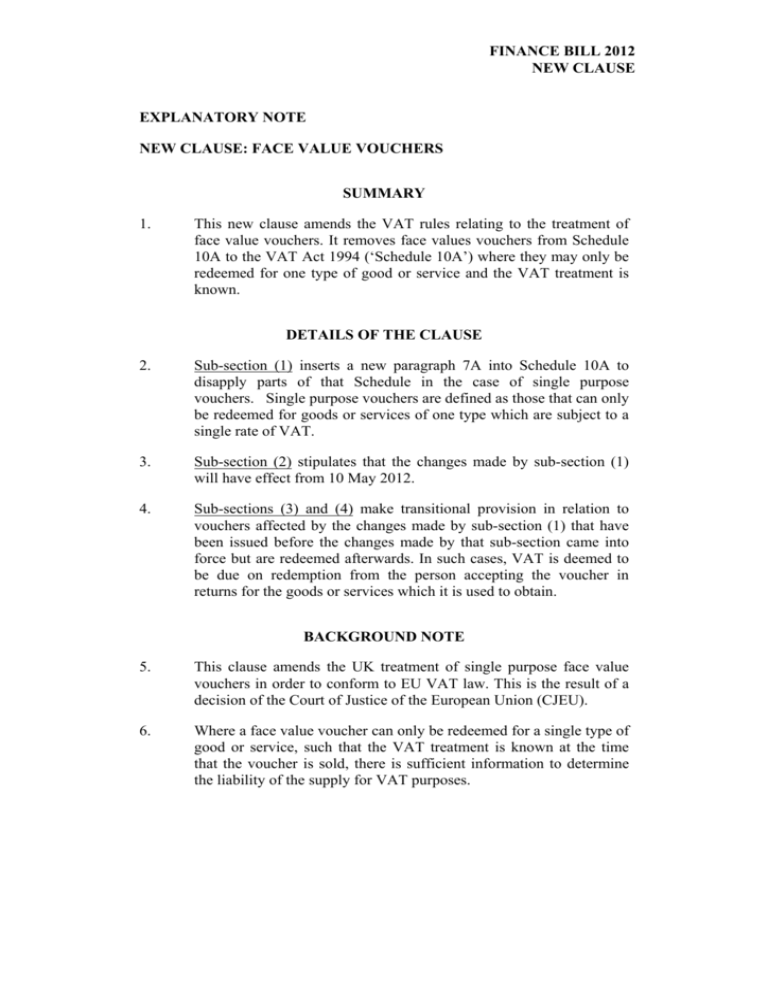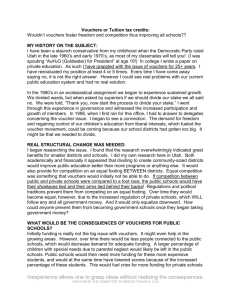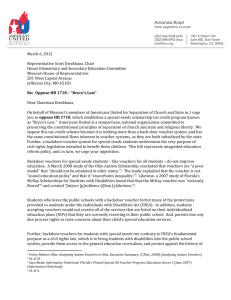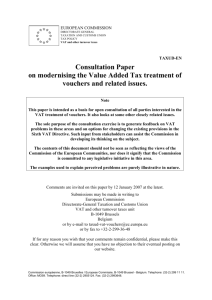VAT and face value vouchers
advertisement

FINANCE BILL 2012 NEW CLAUSE EXPLANATORY NOTE NEW CLAUSE: FACE VALUE VOUCHERS SUMMARY 1. This new clause amends the VAT rules relating to the treatment of face value vouchers. It removes face values vouchers from Schedule 10A to the VAT Act 1994 (‘Schedule 10A’) where they may only be redeemed for one type of good or service and the VAT treatment is known. DETAILS OF THE CLAUSE 2. Sub-section (1) inserts a new paragraph 7A into Schedule 10A to disapply parts of that Schedule in the case of single purpose vouchers. Single purpose vouchers are defined as those that can only be redeemed for goods or services of one type which are subject to a single rate of VAT. 3. Sub-section (2) stipulates that the changes made by sub-section (1) will have effect from 10 May 2012. 4. Sub-sections (3) and (4) make transitional provision in relation to vouchers affected by the changes made by sub-section (1) that have been issued before the changes made by that sub-section came into force but are redeemed afterwards. In such cases, VAT is deemed to be due on redemption from the person accepting the voucher in returns for the goods or services which it is used to obtain. BACKGROUND NOTE 5. This clause amends the UK treatment of single purpose face value vouchers in order to conform to EU VAT law. This is the result of a decision of the Court of Justice of the European Union (CJEU). 6. Where a face value voucher can only be redeemed for a single type of good or service, such that the VAT treatment is known at the time that the voucher is sold, there is sufficient information to determine the liability of the supply for VAT purposes. FINANCE BILL 2012 NEW CLAUSE 7. Schedule 10A currently disregards the supply of such vouchers when issued. For VAT to be brought to account, it must be due on redemption. The CJEU has found that this treatment is wrong for single purpose face value vouchers. It is therefore necessary to remove the disregard for these in order to prevent them escaping taxation. 8. Without this clause, businesses would be able to put in place arrangements to sell goods or services through the issue of vouchers and avoid having to account for VAT on them. 9. The transitional provisions seek to tax single purpose face value vouchers whose issue escaped taxation under the prior rules and whose redemption is untaxed under the new rules. They are also intended to prevent forestalling of vouchers by the issuing of high values immediately prior to the change. 1 1 Face-value vouchers (1) In Schedule 10A to VATA 1994 (face-value vouchers), after paragraph 7 insert— “Exclusion of single purpose vouchers 7A Paragraphs 2 to 4, 6 and 7 do not apply in relation to the issue, or any subsequent supply, of a face-value voucher that represents a right to receive goods or services of one type which are subject to a single rate of VAT.” (2) The amendment made by subsection (1) has effect in relation to supplies of face-value vouchers issued on or after 10 May 2012. (3) Subsection (4) applies where— (a) a face-value voucher issued before 10 May 2012 is used on or after that date to obtain goods or services, (b) paragraphs 2 to 4, 6 and 7 of Schedule 10A to VATA 1994 would not have applied in relation to the issue, or any subsequent supply, of the voucher because of paragraph 7A of that Schedule if the voucher had been issued on or after 10 May 2012, and (c) VAT is not payable under the law of another member State on the supply of the voucher to the user. (4) The use of the voucher is to be treated for the purposes of VATA 1994 as a supply of the goods or services by the person from whom they are obtained to the user of the voucher.








